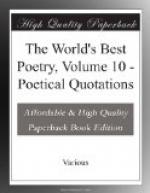“And thus, after a time, we clothe a hymn with the memories and associations of our own life. It is garlanded with flowers which grew in our hearts. Born of the experience of one mind, it becomes the unconscious record of many minds.... Thus sprung from a wondrous life, hymns lead a life yet more wonderful. When they first come to us they are like the single strokes of a bell ringing down to us from above; but, at length, a single hymn becomes a whole chime of bells, mingling and discoursing to us the harmonies of a life’s Christian experience.”
Passing from this very human and sympathetic view of the profoundest use of poetry, note how the veteran Bryant confirms it. In treating of the beautiful mythologies of Greece and Rome, so much of which entered into the warp and woof of ancient poetry, he grants their poetical quality, but doubts whether, on the whole, the art gained more than it lost by them, because, having a god for every operation of nature, they left nothing in obscurity; everything was accounted for; mystery—a prime element of poetry—existed no longer. Moreover:
“That system gave us the story of a superior and celestial race of beings, to whom human passions were attributed, and who were, like ourselves, susceptible of suffering; but it elevated them so far above the creatures of earth in power, in knowledge, and in security from the calamities of our condition, that they could be the subjects of little sympathy. Therefore it is that the mythological poetry of the ancients is as cold as it is beautiful, as unaffecting as it is faultless....
“The admirers of poetry, then, may give up the ancient mythology without a sigh. Its departure has left us what is better than all it has taken away: it has left us men and women; it has left us the creatures and things of God’s universe, to the simple charm of which the cold splendor of that system blinded men’s eyes, and to the magnificence of which the rapid progress of science is every day adding new wonders and glories. It has left us, also, a more sublime and affecting religion, whose truths are broader, higher, nobler than any outlook to which its random conjectures ever attained.”
Yet, after all, returning from this consideration of poetic themes to the question of the poetic principle itself; we may find a sturdy assertion of it in a few words by Edgar Allan Poe—perhaps the most acute of the many debaters of this apparently simple yet evasive problem. After discussing the elements of poetry in music, painting, and other art, Poe writes:
“I would define, in brief, the Poetry of words as the Rhythmical Creation of Beauty! Its sole arbiter is Taste. With the Intellect, or with the Conscience, it has only collateral relations. Unless incidentally, it has no concern whatever with Duty or with Truth....
“In the contemplation of Beauty we alone find it possible to attain that pleasurable elevation, or excitement of the soul, which we recognize as the Poetic Sentiment, and which is so easily distinguished from Truth, which is the satisfaction of the Reason, or from Passion, which is excitement of the Heart. I make Beauty, therefore—using the word as inclusive of the sublime—I make Beauty the province of the poem....




